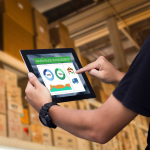Shift Your Focus: Key Aspects of Data-Driven Logistics
This is a guest post by Berta Melder.

According to research, 71% of shippers consider real-time analytics highly valuable, and 61% of them evaluate third-party logistics trade lanes based on the service level and costs. Shippers look for opportunities to capitalize on logistics providers’ expertise in strategic management, customer engagement, and IT. The practice has shown that data-driven processes in logistics satisfy customers’ needs much faster and also help to quickly expand into new markets, which is the main reason why big data disrupts the supply chain.
At the same time, increased amounts of data introduce certain challenges. Drones, self-driving vehicles, and navigation applications require logistics companies to implement numerous long-term improvements. International transportation and logistics companies increase the use of machine learning and big data, realizing that it’s the only way to satisfy online retailers.
What is Data-Driven Logistics
The success of any logistics company depends on efficient transportation, timeliness, and accuracy. Such companies also have to balance between meeting customer demand and managing inventory levels. Therefore, an ability to predict the demand at a certain moment offers a significant advantage.
Big data allows companies to use predictive analytics, tracking historical data, analyzing patterns, and predicting future behavior by taking into account trends and focusing on customer preferences. However, predictive analytics is just one of many possible applications of data in logistics.
Amazon is a great example of a company that uses the most advanced data-driven technologies available, constantly improving its delivery services. Although some data sharing policies and legacy mentality still create a number of difficulties for logistics companies, most of them realize the necessity of competing with giants like Amazon, which offer better prices and expand at a rapid pace.
More and more companies use data for decision-making and automation. Artificial intelligence also offers automatic alternatives for traditional trusty forklifts, improving efficiency significantly. For example, the use of automation allowed Amazon to shrink delivery times to 24-48 hours.
Key Aspects of Data-Driven Logistics
1. Blockchain and big data
Demand for IT services in logistics has increased during the last few years, as small and midsize exporters and importers need to compete with larger companies that already use blockchain and big data. These technologies allow companies to approve shipment specifications, to monitor conditions of their cargo, to see whether their cargo has been loaded, and to check the conditions in a container with just a few mouse clicks. The data stored in a blockchain cannot be altered, and therefore is perfectly protected. At the same time, it allows companies to track delivery receipts, arrival dates, and customs clearance, increasing transparency.
2. Application Programming Interface (API)
APIs allow logistics companies to communicate data more efficiently, using IoT (internet of things) devices in real-time. Companies need to make sure that the right information can be accessed by the right people, including third parties and internal teams. Accessing valuable data usually involves a lot of manual labor, while APIs eliminate the need for manual checks, ensuring automated communication between devices. Managers only need to interfere with these processes to share or cancel modification rights within the network and to approve data access. Another advantage of APIs is that they can be easily integrated into any management platform or dashboard.
3. Safe payments and fast cross-border transactions
The use of credit and debit cards is a global trend. At the same time, cryptocurrencies introduced an alternative approach to secure international payments, which couldn’t remain unnoticed by the logistics industry. As consumers get used to a certain level of payment convenience, logistics companies need to adapt to their demands, offering flexibility. This is the main reason why Bitcoin gets widely accepted, being both a flexible and safe solution that ensures customer privacy. Cryptocurrencies make it easier for logistics companies to guarantee the privacy and safety of cross-border payments.
Conclusion
As customer expectations and transport costs grow, many companies are searching for technological solutions that will help them address these issues.
Although catching up with the latest technological trends is not an easy task, investments in data-driven solutions are the only way to maintain a competitive business advantage. Therefore, the worldwide adoption of data-driven technologies, which is already apparent, is expected to grow in the nearest future.
AI-based solutions, blockchain, and big data increase the efficiency of many logistics processes, while also increasing the visibility and transparency of operations. Thus, the main reason why data-driven logistics grows in popularity is that it allows companies to quickly respond to fluctuating demands.
About the Author

Berta Melder is an experienced brand manager and content marketing strategist for Masterra, but thinking about additional career development opportunities as a data visualisation specialist. She also manages the company’s internal training activities on branding. Follow her on Twitter.





Your blog is very informative. Here you talk about the Key Aspects of Data-Driven Logistics. This information is very useful for logistics Provider company.
thanks for sharing.